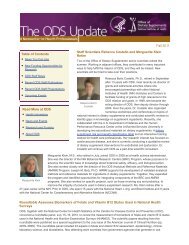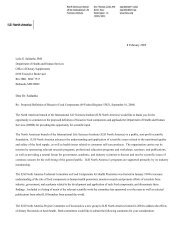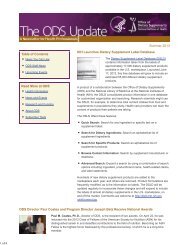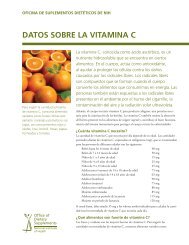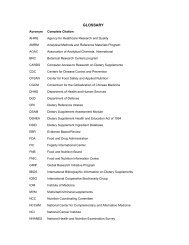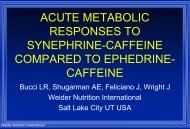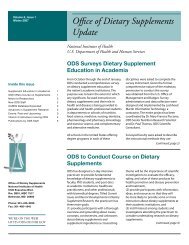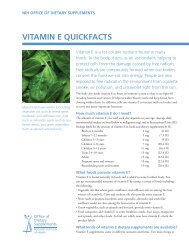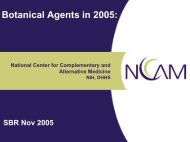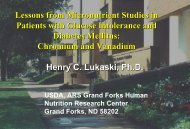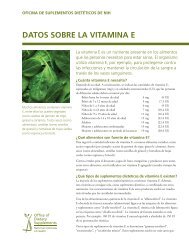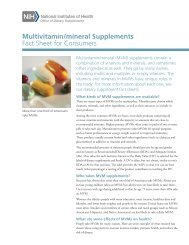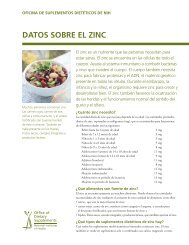status report - Office of Dietary Supplements - National Institutes of ...
status report - Office of Dietary Supplements - National Institutes of ...
status report - Office of Dietary Supplements - National Institutes of ...
Create successful ePaper yourself
Turn your PDF publications into a flip-book with our unique Google optimized e-Paper software.
Zinc and Health: Current Status and Future Directions, A Workshop<br />
Zinc: What Role Might <strong>Supplements</strong> Play? A Conference<br />
The ODS initiated a two-day workshop, followed by a one-day conference, to provide an<br />
overview <strong>of</strong> the biochemical, cellular, and nutritional requirements <strong>of</strong> zinc in health and disease<br />
and the role <strong>of</strong> dietary supplementation with zinc. The meetings were co-sponsored by six NIH<br />
institutes and <strong>of</strong>fices, other federal agencies, and two pr<strong>of</strong>essional associations. Attention was<br />
focused on the key areas where zinc supplementation may play a role in the prevention,<br />
reduction or treatment <strong>of</strong> disease. These meetings brought together leading experts in zinc<br />
research and clinicians from many scientific disciplines to present a timely update and critical<br />
needs assessment on zinc and health to researchers, nutritionists, public health advisers, and<br />
policy makers. These scientists presented reviews <strong>of</strong> the current state <strong>of</strong> scientific knowledge that<br />
are applicable to many basic science, clinical, and public health programs across the country.<br />
The workshop sessions focused on: zinc and the immune system, gastrointestinal tract, and the<br />
central nervous system; antioxidant and defense functions <strong>of</strong> zinc; zinc and cellular mechanisms;<br />
and zinc in growth and specific disease entities. New and emerging roles <strong>of</strong> zinc and zinc<br />
supplementation in human health were also discussed, as well as new measurement and<br />
assessment techniques that are available in the field <strong>of</strong> zinc research. Key areas that warrant<br />
further investigation were also identified. The one-day conference was focused on the question<br />
<strong>of</strong> zinc supplementation and summarized for the public the relevant findings on dietary zinc<br />
requirements, the regulation <strong>of</strong> zinc metabolism, zinc and development, zinc and immune<br />
function, zinc metabolism in disease, and zinc intake <strong>of</strong> the U.S. population.<br />
The ODS will publish the proceedings <strong>of</strong> the workshop as a supplement to the Journal <strong>of</strong><br />
Nutrition. A formal bibliography was prepared in conjunction with the <strong>National</strong> Library <strong>of</strong><br />
Medicine and is available through the Current Bibliographies in Medicine series. This<br />
bibliography and the scientific abstracts from the conference are available through the ODS<br />
Internet home page (http://dietary-supplements.info.nih.gov). Workshop held: November 4-5,<br />
1998, Bethesda, MD. Conference held: November 6, 1998, Bethesda, MD.<br />
Publications from this workshop:<br />
• Glazer, A., Scannell, K.M., Costello, R.B., Krakower, T.J. and Marriott, B.M.,<br />
compilers.(1998) Zinc and health [bibliography on the Internet]. Bethesda, MD: <strong>National</strong><br />
Library <strong>of</strong> Medicine, 1998 Oct. (Current bibliographies in medicine, no. 98-3). 3619 citations<br />
from January 1990 through June 1998. Available from<br />
http://www.nlm.nih.gov/pubs/resources.html.<br />
PAST ACCOMPLISHMENTS<br />
Establishing Upper Safe Limits for B Vitamin Intake, A Scientific Report<br />
The ODS co-funded with the Centers for Disease Control and Prevention and the Food<br />
and Drug Administration an 18-month <strong>National</strong> Academy <strong>of</strong> Sciences project on the <strong>Dietary</strong><br />
Reference Intakes (DRIs) (formerly called the Recommended <strong>Dietary</strong> Allowances) for folate and<br />
other B vitamins. The ODS specifically funded a contract to the Food and Nutrition Board<br />
(FNB), Institute <strong>of</strong> Medicine, to continue and extend their consideration <strong>of</strong> DRIs for folate and<br />
related nutrients to include the development <strong>of</strong> Tolerable Upper Intake Levels (ULs) <strong>of</strong> safety.<br />
The FNB has established a Subcommittee (within the Standing Committee on the Scientific<br />
Evaluation <strong>of</strong> DRIs) on the Upper Safe Reference Levels <strong>of</strong> Nutrients. This subcommittee<br />
developed a risk assessment model to establish maximum levels <strong>of</strong> nutrient intakes that are<br />
24



